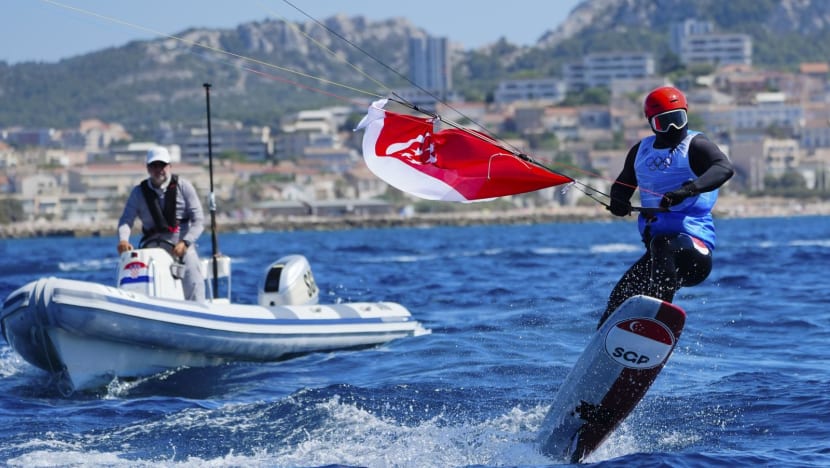A 'good lesson' for the future: Max Maeder's coach on ups and downs of historic Olympic outing
"When you're coming in like the biggest favourite it is a disadvantage. There's a lot of pressure on you," says Ivica Dolenc, who has trained the Singaporean since he was 14.

Maximilian Maeder with his coach Ivica Dolenc. (Photo: Kong Chong Yew/SNOC)

This audio is generated by an AI tool.
MARSEILLE: Years before a Singaporean teenager stood on an Olympic podium last Friday (Aug 9), a Croatian kitefoiling coach thought he'd spotted something special.
"You could see from the early beginnings that he's showing potential, big potential," said Ivica Dolenc, who trains Paris 2024 bronze medallist Maximilian Maeder.
Success in sport requires a "formula" of maybe 10 to 15 factors, of which a crucial one is cognitive ability - and which Maeder, now 17, scores "very, very high" on, Dolenc told CNA.
Known by some as Johnny, he has coached Maeder since he was 14. And when the Singaporean trains in Croatia, he stays with the Dolencs. "Max is like a member of our family more or less," said his coach, whose son Martin is also a kitefoiler and finished 14th at the Paris Olympics.
From Dolenc's vantage position, a number of factors complicated Maeder's pursuit of a medal at the recently completed Games.
For one, there were fewer races in the opening series, compared with typical kitefoiling competitions where up to 20 are contested.
Given consistently poor wind conditions at the Marseille Marina, Maeder and the rest of the fleet only competed in seven races - out of a possible 16 - before the final.
This "didn't allow us to show everything we can do", said Dolenc.
The final, which was scheduled to be completed on Thursday, required an extra day of racing due to a lack of wind. Even then, there was a considerable delay before riders finally took to the water on Friday.
It was the first time Maeder faced such a situation - two days of racing for a medal.
"There was a lot, with wind coming up and down. This (left) a mark on us for sure," added his coach Dolenc.
When the first race of Friday was flagged off, it was Maeder who started well. But Austrian Valentin Bontus soon caught up and gradually stretched out a lead that he did not relinquish.
This put Bontus on two race wins, after an earlier victory on Thursday, and level with the Slovenian and opening series leader Toni Vodisek.
In the final, competitors need three race wins or match points to secure gold.
This left Maeder, who held one match point by virtue of finishing second in the opening series, in a must-win situation for the next race to keep any chance of a gold medal alive.
It was Bontus with a storming start, with Maeder hot on his heels. But in the end, it was the Austrian as well as Italian Riccardo Pianosi who fought it out at the front of the pack. Bontus then applied the afterburners to win his third straight race and Olympic gold.
"There (are) countless things that athletes always wish they could have, should have, would have done better ... A lot of decisions have to be made very quickly, and so you can't think about them while you're out on the water," said Maeder.
"You have a bunch of 'If A then B' (situations). And that's part of the plan you have on the water ... The problem was a situation came up, I didn't make decision B and so if perhaps I did follow that decision, it would have gone differently and better. Or at least I would have known that I stuck to the plan. But I didn't.
"That would be the distillation of the sub-optimal thing that happened."
NEXT TIME WILL BE DIFFERENT
Going into the Olympics as back-to-back world champion and holder of five straight titles also meant a "favourite" tag on Maeder - which Dolenc described as a "disadvantage".
"It's a lot of pressure on you, a lot of things going on," he explained.
Asked how Maeder, the youngest in the men's kitefoiling fleet, would learn from his Olympic experience, Dolenc said it will be a "good lesson".
"For sure, for next time, we'll prepare a bit differently."
And Maeder has already grown tremendously over the years, said his coach.
"He is much more calm, he's thinking maybe a step or two steps in advance. That's what he has learnt from the process," said Dolenc. "He (has) learnt to trust himself. And I think he has much more self-confidence than he had when was younger."
As Singapore celebrates the teenager, his coach hopes Maeder too will recognise his own momentous deed.
"Max, after everything dies down, he'll feel how big achievement this is," said Dolenc, adding that a "big future" awaits his charge.
It may have already sunk in for Maeder, just as he's already looking ahead.
"What we are doing so far works well, we just have to refine and improve it," he said. "I can continue learning, I can continue improving."
As Singapore’s Olympics Network, Mediacorp will bring you live coverage of the celebratory parade for Team Singapore’s Paris 2024 Olympians, straight from the athlete bus. Catch the live stream and exclusive interviews with our Olympians on mewatch, Mediacorp Entertainment on YouTube and CNA YouTube, as well as on Mediacorp’s official Facebook and TikTok pages from 11.30am on Aug 14.

















